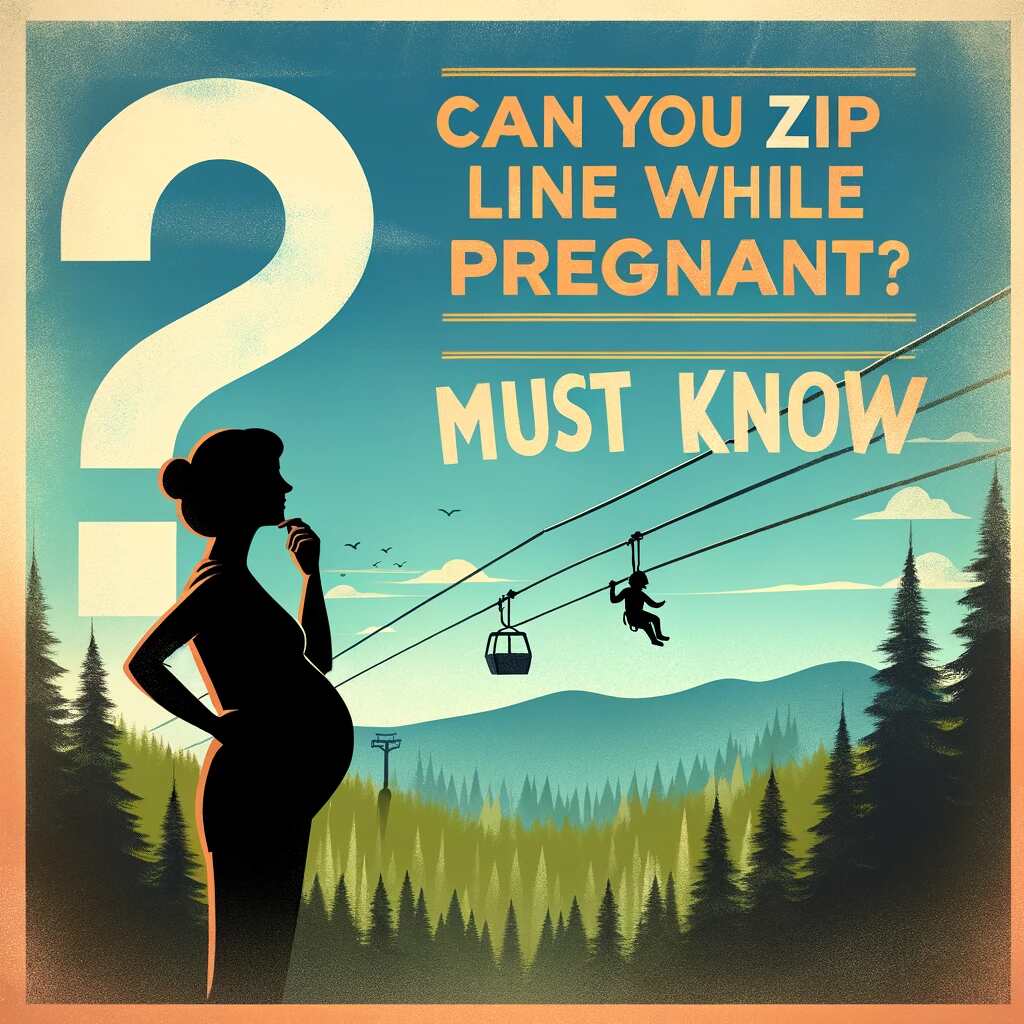Ziplining is an incredible outdoor adventure that lets adrenaline junkies soar through the treetops, taking in breathtaking landscapes. But if you’re an expectant mother, you might be wondering if can you zipline while pregnant. Ziplining, while exhilarating, comes with its fair share of risks, and when you’re pregnant, your top priority is the safety of both you and your unborn child.
Unfortunately, the consensus is that ziplining while pregnant isn’t a good idea due to potential risks. The harness and lanyard used in ziplining can put uncomfortable pressure on your abdominal area, which can be concerning during pregnancy. Most zipline companies have a policy in place that requires participants to confirm they aren’t pregnant through a liability waiver, all in the name of safety.
Understanding the Concerns of Zipline While Pregnant
Pregnancy is a period of significant physical and hormonal changes. Your body undergoes numerous adaptations to support your growing baby, including increased blood volume, shifts in your center of gravity, and loosening of ligaments. While many pregnant women continue with their active lifestyles, some activities can pose risks to both the mother and the baby, and ziplining is one of them.
Ziplining usually involves wearing a harness and being suspended from a cable by a lanyard. This gear secures participants in a horizontal position, potentially adding pressure to your abdominal area. When combined with the physiological changes happening during pregnancy, this pressure can lead to discomfort, injuries, or complications.
Risks of Ziplining During Pregnancy
- Abdominal Pressure: The harness and lanyard used in ziplining can create pressure on your abdomen, where your uterus is. This pressure may not feel comfortable and could potentially harm your developing baby.
- Sudden Stops and Jolts: Ziplining experiences often include abrupt stops or jolts, especially when reaching the end of a zipline or changing direction. These sudden movements can increase the risk of trauma to your abdomen, potentially leading to complications.
- Falling Risk: While zipline operators take safety seriously, there’s always a slight risk of falling during a ziplining adventure. Pregnant women might have a higher risk of losing balance due to their changing center of gravity, which could result in a fall.
- Increased Heart Rate: Ziplining can be exhilarating and physically demanding, causing your heart rate and blood pressure to rise. While this is generally safe for most people, it might not be advisable for pregnant women, especially those with certain medical conditions.
- Environmental Factors: Ziplining often happens in remote and challenging environments. Pregnant women may be exposed to extreme temperatures, strenuous hikes, or other physical demands that can be particularly taxing during pregnancy.
Zipline Operators Policies and Liability Waivers
Most reputable zipline operators prioritize safety above all else and have strict policies in place to protect participants. One common policy is asking participants to confirm that they aren’t pregnant before embarking on a ziplining adventure. This requirement is typically included in the liability waiver participants must sign.
This inclusion isn’t meant to discriminate against pregnant women; rather, it’s about ensuring their safety and the safety of their unborn child. Ziplining companies have a responsibility to minimize risks, and pregnancy is considered a condition that may increase the likelihood of accidents or complications.
Healthcare Professional Guidance
Before making any decisions about ziplining or any other physical activities during pregnancy, it’s crucial for expectant mothers to consult with their healthcare providers. Obstetricians and midwives can provide personalized advice based on your health, the progression of your pregnancy, and any underlying medical conditions.
Healthcare professionals will consider factors such as the stage of your pregnancy, your overall health, and the specific risks associated with ziplining in your local environment. In most cases, they are likely to recommend against ziplining during pregnancy, especially during the second and third trimesters when the risks are more significant.
Alternative Activities for Expectant Mothers
While ziplining might not be an option for pregnant women, there are plenty of safe and enjoyable alternatives to help you stay active, healthy, and engaged during pregnancy. Here are some suggestions:
- Walking: Regular walks are a low-impact and excellent way to stay active during pregnancy. They improve cardiovascular health, maintain fitness, and provide mental relaxation.
- Swimming: Swimming and water aerobics are ideal exercises for pregnant women. The buoyancy of the water reduces strain on joints and offers a full-body workout.
- Prenatal Yoga: Prenatal yoga classes are tailored to the needs of pregnant women, focusing on gentle stretches, relaxation, and breathing exercises to promote flexibility and reduce stress.
- Stationary Cycling: Riding a stationary bike is a safe way to maintain cardiovascular fitness while reducing the risk of falling or injury.
- Prenatal Exercise Classes: Many fitness centers offer prenatal exercise classes designed to keep expectant mothers fit and healthy. These classes often include modified exercises suitable for each stage of pregnancy.
- Meditation and Relaxation: Pregnancy can be a stressful time, and activities like meditation, deep breathing exercises, and prenatal massage can help alleviate stress and promote well-being.
Essential Picks for Active Moms-to-Be: Gear and Wellness Products
1. Prenatal Health and Wellness Books
- “What to Expect When You’re Expecting” by Heidi Murkoff: This comprehensive guide is a must-read for expectant mothers, offering valuable information on every stage of pregnancy.
2. Maternity Activewear
- Motherhood Maternity Activewear Pants: Comfortable and stylish, these pants are perfect for light exercises or casual walks, ensuring expectant mothers stay active and comfortable.
3. Prenatal Yoga Equipment
- BalanceFrom GoYoga All-Purpose Yoga Mat: This extra-thick yoga mat provides cushioning and support for prenatal yoga sessions, ensuring comfort and safety.
4. Safety Gear for Alternative Outdoor Activities
- Schwinn Thrasher Bike Helmet: For moms-to-be who enjoy cycling, this helmet offers excellent protection while being comfortable to wear.
5. Hydration Solutions for Outdoor Activities
- CamelBak Eddy+ BPA Free Water Bottle: Staying hydrated is crucial, and this water bottle is designed for easy sipping and carrying on light walks or exercise sessions.
6. Comfortable Footwear for Walking
- ASICS Women’s Gel-Venture 7 Running Shoes: These shoes provide great support and comfort, ideal for pregnant women who enjoy regular walks.
7. Relaxation and Stress Relief Products
- InnoGear Essential Oil Diffuser: This diffuser is perfect for creating a relaxing atmosphere at home, beneficial for stress relief during pregnancy.
8. Nutrition and Diet Books for Pregnancy
- “The Whole 9 Months: A Week-By-Week Pregnancy Nutrition Guide” by Jennifer Lang MD: This book offers practical advice and recipes to ensure proper nutrition during pregnancy.
9. Exercise and Fitness DVDs for Pregnancy
- “Prenatal Yoga with Desi Bartlett” DVD: For those who prefer guided exercises at home, this DVD offers safe and effective yoga routines for pregnant women.
FAQs: Ziplining While Pregnant
Q1: Can I zipline during my first trimester?
A1: It’s generally advised against ziplining during any stage of pregnancy, including the first trimester. The risks associated with the harness pressure and sudden movements apply throughout the entire pregnancy.
Q2: Are there any zipline courses that are safer during pregnancy?
A2: No zipline course is considered safe during pregnancy due to the inherent risks of the activity, such as abdominal pressure, sudden stops, and potential falls.
Q3: What if I have previous experience with ziplining?
A3: Even if you are experienced, ziplining while pregnant is not recommended. Pregnancy brings physical and hormonal changes that can affect your balance and overall response to the activity.
Q4: Can I sign a waiver and still go ziplining while pregnant?
A4: While you may be able to sign a waiver, it’s strongly advised against participating in ziplining while pregnant due to the significant risks involved.
Q5: Are there any specific medical conditions that make ziplining more risky during pregnancy?
A5: Yes, conditions like hypertension or any complications in pregnancy increase the risks. Consult your healthcare provider for advice specific to your situation.
Q6: Can the stress or excitement of ziplining affect my pregnancy?
A6: The excitement and physical demands of ziplining can increase your heart rate and blood pressure, which might not be advisable during pregnancy.
Q7: Are there any legal implications of ziplining while pregnant?
A7: Legal implications depend on local laws and the policies of the zipline operators. However, the main concern is the health and safety risk to you and your unborn child.
Q8: Can I go ziplining shortly after giving birth?
A8: It’s best to wait until your body has fully recovered postpartum, which varies for each individual. Consult your healthcare provider before resuming activities like ziplining.
Q9: Are there any insurance considerations when ziplining during pregnancy?
A9: Some insurance policies may not cover activities deemed risky during pregnancy, such as ziplining. It’s essential to check with your insurance provider.
Q10: What other outdoor activities are safe during pregnancy?
A10: Safe activities include walking, swimming, prenatal yoga, and stationary cycling. These provide health benefits without the high risks associated with ziplining.
Q11: Is it safe to go zip lining at 4 weeks pregnant?
A11: During the early stages of pregnancy, such as 4 weeks, your body is undergoing significant changes. While there’s no universal rule against zip lining at this stage, it’s crucial to consider the potential risks. These include jarring motions and the possibility of falls. Consulting with a healthcare provider before engaging in activities like zip lining is highly recommended.
Q12: Can I go zip lining during the second trimester of pregnancy?
A12: The second trimester often brings increased stability in pregnancy, but the risks associated with zip lining – like abrupt stops and high-speed movements – remain. These factors can be risky for both the mother and the developing baby. It’s advisable to discuss such activities with your healthcare provider to understand the specific risks.
Q13: What are the risks of zip lining at 6 weeks pregnant?
A13: At 6 weeks pregnant, the body is still in the very early stages of pregnancy. Activities like zip lining pose risks due to the rapid starts and stops, potential for falls, and the harness’s pressure on the abdomen. It’s important to weigh these risks and consult with a healthcare provider before deciding to zip line.
Q14: Is it okay to zip line while 8 weeks pregnant?
A14: At 8 weeks, your pregnancy is still in a delicate phase. The risks associated with zip lining, such as the physical strain and the potential for falls, make it a potentially risky activity. It’s essential to consider these risks and seek medical advice from your healthcare provider to make an informed decision about such activities.
For more detailed information on pregnancy health and safety, refer to resources provided by the CDC, the Office on Women’s Health, and NIOSH down below.
Conclusion
In conclusion, while ziplining can be an exciting and adventurous activity, it’s generally not recommended for pregnant women. The harness and lanyard used in ziplining can create additional pressure on the abdominal area, which may be uncomfortable and potentially harmful to the developing fetus. Additionally, the physical demands and risks associated with ziplining can pose a danger to pregnant women and their unborn children.
Zipline operators typically have policies in place to ensure the safety of participants, including asking about pregnancy status. This policy isn’t about discrimination but rather about prioritizing safety and well-being.
Expectant mothers should always consult with their healthcare providers before engaging in any physical activities during pregnancy. Healthcare professionals can provide personalized guidance and recommend alternative activities that are safe and beneficial for both the mother and the baby. Ultimately, the health and safety of the expectant mother and her child should always be the top priority.
This advice is supported by experts, trusted zipline operators, and healthcare professionals. Your safety and your baby’s health should always be the top priority in this matter.
Additional information
For comprehensive information on pregnancy health and safety, the Centers for Disease Control and Prevention (CDC) provides resources covering various aspects, from pre-conception to post-birth. It includes guidelines on nutrition, substance use, infections, vaccinations, and managing chronic diseases during pregnancy.
The Office on Women’s Health offers dietary recommendations and emphasizes the importance of hydration, avoiding alcohol, and regulating caffeine intake during pregnancy.
The National Institute for Occupational Safety and Health (NIOSH) advises pregnant women to assess workplace hazards and discusses how pregnancy can impact safety at work due to physical and physiological changes.










